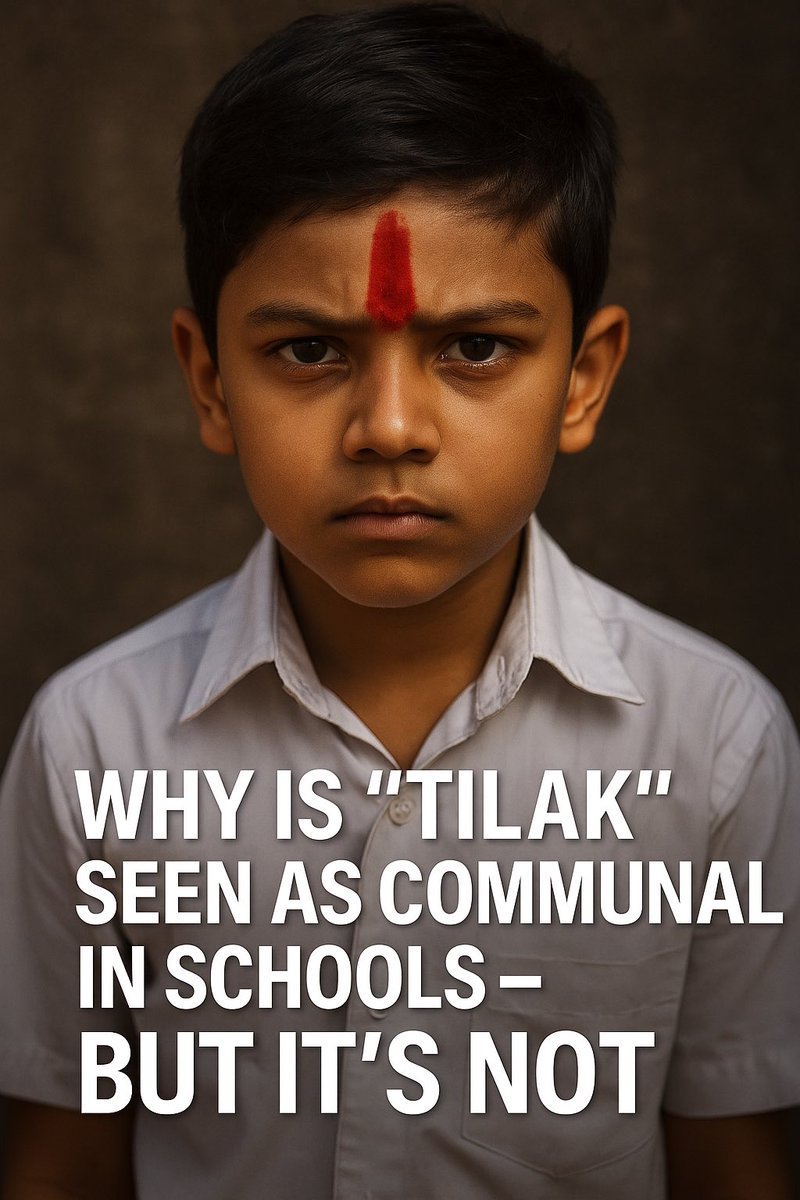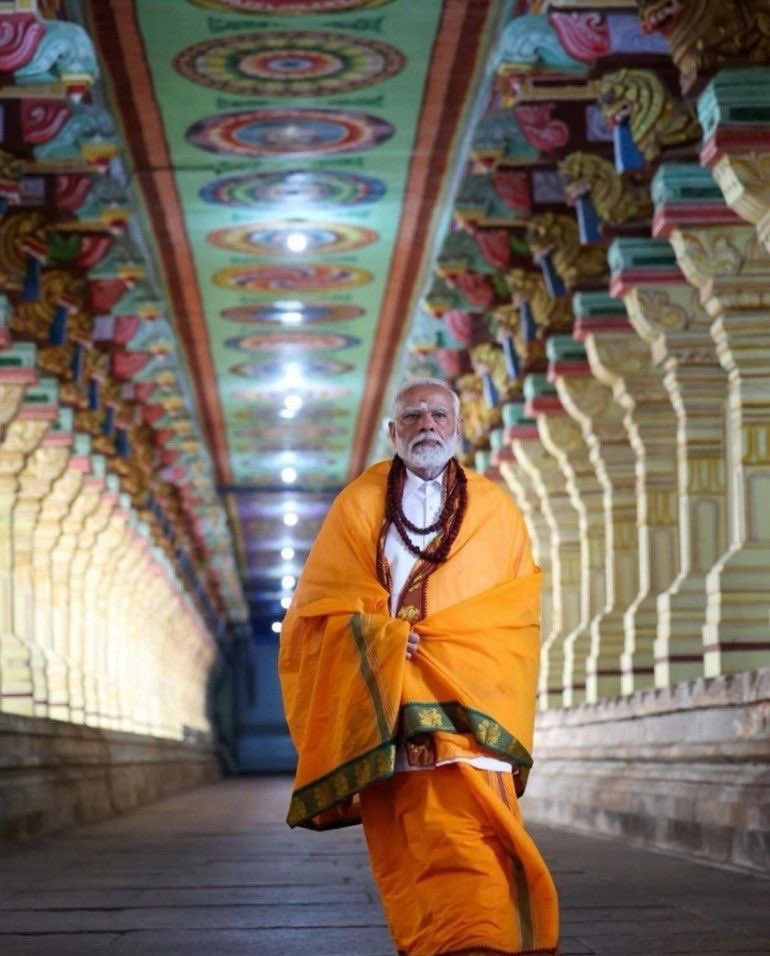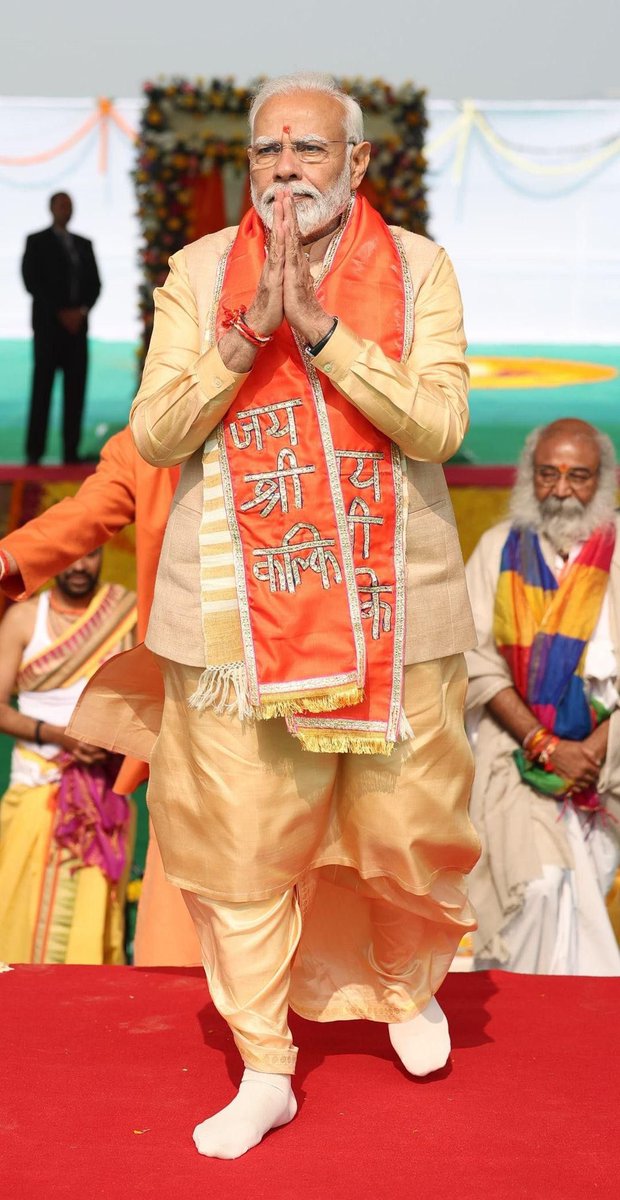Why Hindus Need Shastra Training - Not Just Shlokas
#longthread 🧵
We teach our kids to say “Om Namah Shivaya”…
But not how to answer when someone asks,
“Why do you worship idols?”
We tell them to say “Vasudhaiva Kutumbakam”…
But we stay quiet when our Dharma is mocked on screen.
We chant shlokas with full bhakti…
But we’ve forgotten the Shastra -
The strength, knowledge, and clarity that once made Hindus unshakeable.
This thread is for every Hindu who feels the pain of silence…
And knows that devotion alone is not enough anymore.
Read it fully. And rise.👇
#longthread 🧵
We teach our kids to say “Om Namah Shivaya”…
But not how to answer when someone asks,
“Why do you worship idols?”
We tell them to say “Vasudhaiva Kutumbakam”…
But we stay quiet when our Dharma is mocked on screen.
We chant shlokas with full bhakti…
But we’ve forgotten the Shastra -
The strength, knowledge, and clarity that once made Hindus unshakeable.
This thread is for every Hindu who feels the pain of silence…
And knows that devotion alone is not enough anymore.
Read it fully. And rise.👇
1. A lion needs claws - not just a soft heart.
Yes, we believe in peace.
But peace without power is useless.
When invaders came, temples were broken, books were burnt - because we forgot to defend.
Even now, people insult Ramayan, call Gita violent, say idol worship is backward.
And what do we do? Smile nervously or walk away.
That’s not peace. That’s fear.
Your Dharma is not weak.
But without knowledge, you become weak.
Yes, we believe in peace.
But peace without power is useless.
When invaders came, temples were broken, books were burnt - because we forgot to defend.
Even now, people insult Ramayan, call Gita violent, say idol worship is backward.
And what do we do? Smile nervously or walk away.
That’s not peace. That’s fear.
Your Dharma is not weak.
But without knowledge, you become weak.
2. Shlokas are prayers. Shastra is protection.
Reciting mantras gives peace.
But when your belief is questioned, what protects you?
It’s Shastra - the logic, philosophy, and history of Sanatan Dharma.
A child who knows only shlokas can be converted with one fake argument.
But a child trained in Dharma won’t bend easily.
Shastra training is not pride - it’s survival.
You don’t need to be a scholar.
Just know enough to speak with confidence.
That’s how Dharma lives on - not just in temples, but in truth.
Reciting mantras gives peace.
But when your belief is questioned, what protects you?
It’s Shastra - the logic, philosophy, and history of Sanatan Dharma.
A child who knows only shlokas can be converted with one fake argument.
But a child trained in Dharma won’t bend easily.
Shastra training is not pride - it’s survival.
You don’t need to be a scholar.
Just know enough to speak with confidence.
That’s how Dharma lives on - not just in temples, but in truth.
3. We lost for 1000 years because we stopped training the mind.
Temples were rich. Culture was alive.
But we forgot to train the mind.
And that’s why we were ruled again and again.
Invaders came with swords.
Missionaries came with lies.
Modernists came with mocking tones.
And we just watched.
Why? Because we left Shastra training behind.
A Dharma that teaches Gita, Vedanta, Nyaya, Yoga -
was reduced to rituals without reason.
Now we must reverse that.
Temples were rich. Culture was alive.
But we forgot to train the mind.
And that’s why we were ruled again and again.
Invaders came with swords.
Missionaries came with lies.
Modernists came with mocking tones.
And we just watched.
Why? Because we left Shastra training behind.
A Dharma that teaches Gita, Vedanta, Nyaya, Yoga -
was reduced to rituals without reason.
Now we must reverse that.
4. Today’s Hindu child is under attack - silently.
From classrooms to cartoons,
from OTT shows to history books -
Dharma is attacked in small, daily ways.
They ask: “Why do you worship cows?”
“Why are there so many gods?”
“Is caste part of Hinduism?”
“Did Ram really exist?”
If our children don’t get bold, clear answers,
they will get confused.
Confusion leads to shame.
And shame leads to walking away from Dharma.
From classrooms to cartoons,
from OTT shows to history books -
Dharma is attacked in small, daily ways.
They ask: “Why do you worship cows?”
“Why are there so many gods?”
“Is caste part of Hinduism?”
“Did Ram really exist?”
If our children don’t get bold, clear answers,
they will get confused.
Confusion leads to shame.
And shame leads to walking away from Dharma.
5. Shastra training starts at home. Not in university.
You don’t need big degrees to teach Dharma.
You need conviction and love.
Read Amar Chitra Katha.
Explain what Gita really says.
Show them who Swami Vivekananda, Chanakya, Rani Durgavati were.
Make them proud of who they are -
not just through stories, but by showing truth, logic, and strength.
Home is the first Gurukul.
And you, the first guru.
You don’t need big degrees to teach Dharma.
You need conviction and love.
Read Amar Chitra Katha.
Explain what Gita really says.
Show them who Swami Vivekananda, Chanakya, Rani Durgavati were.
Make them proud of who they are -
not just through stories, but by showing truth, logic, and strength.
Home is the first Gurukul.
And you, the first guru.
6. Shastra is not Sanskrit-only. It’s for every Hindu.
Don’t let people scare you with big words.
You don’t need to chant heavy verses.
You just need to know:
- What is Dharma?
- What does Gita say about fear?
- Why do we bow to cows?
- What did Krishna really teach?
If you can explain Dharma in simple words -
you’ve already started your Shastra journey.
Don’t let people scare you with big words.
You don’t need to chant heavy verses.
You just need to know:
- What is Dharma?
- What does Gita say about fear?
- Why do we bow to cows?
- What did Krishna really teach?
If you can explain Dharma in simple words -
you’ve already started your Shastra journey.
7. Bhakti needs Buddhi. Love needs Logic.
Ram didn’t fight Ravan with bhajans.
He built a vanar sena. He strategised. He acted.
Krishna didn’t just sing. He gave Arjun knowledge.
He told him to stand up and fight.
Our Dharma is not blind worship.
It is awakened awareness.
That’s why our gods carry both:
A flower in one hand, and a weapon in the other.
Ram didn’t fight Ravan with bhajans.
He built a vanar sena. He strategised. He acted.
Krishna didn’t just sing. He gave Arjun knowledge.
He told him to stand up and fight.
Our Dharma is not blind worship.
It is awakened awareness.
That’s why our gods carry both:
A flower in one hand, and a weapon in the other.
8. Don’t raise kids who only chant. Raise kids who can challenge.
One trained child can stop ten missionaries.
One proud Hindu youth can change a whole college group.
One confident speaker can silence a thousand lies.
Train them to ask, speak, explain, defend.
That is not arrogance.
That is responsibility.
Let your child be the one who says:
“I know who I am. I don’t need approval from anyone.”
One trained child can stop ten missionaries.
One proud Hindu youth can change a whole college group.
One confident speaker can silence a thousand lies.
Train them to ask, speak, explain, defend.
That is not arrogance.
That is responsibility.
Let your child be the one who says:
“I know who I am. I don’t need approval from anyone.”
9. Dharma doesn’t survive on silence. It survives on Shastra.
Every time we stayed silent, we lost a little more.
Land. Temples. Language. Self-respect.
When we knew our Shastra, we debated kings and scholars.
Now, we struggle to reply to tweets.
Silence is not peace.
Knowledge is peace.
And courage is Dharma.
Every time we stayed silent, we lost a little more.
Land. Temples. Language. Self-respect.
When we knew our Shastra, we debated kings and scholars.
Now, we struggle to reply to tweets.
Silence is not peace.
Knowledge is peace.
And courage is Dharma.
10. You don’t need to win arguments. You just need to stand strong.
Shastra training is not about shouting or insulting.
It’s about standing steady.
When someone says, “Hinduism is violent”,
you don’t get angry.
You smile and say:
“Let’s talk facts. Let me show you.”
That calm, unshakeable voice is what scares liars.
Be that voice.
Shastra training is not about shouting or insulting.
It’s about standing steady.
When someone says, “Hinduism is violent”,
you don’t get angry.
You smile and say:
“Let’s talk facts. Let me show you.”
That calm, unshakeable voice is what scares liars.
Be that voice.
11. Teach what the enemy fears - clarity.
Do you know what they fear most?
A Hindu who can explain Dharma in simple, fearless words.
Because once you explain clearly -
conversion stops. Confusion ends. Propaganda fails.
Shastra is the enemy of ignorance.
And ignorance is their biggest weapon.
Do you know what they fear most?
A Hindu who can explain Dharma in simple, fearless words.
Because once you explain clearly -
conversion stops. Confusion ends. Propaganda fails.
Shastra is the enemy of ignorance.
And ignorance is their biggest weapon.
12. Temples must become training grounds - not just donation boxes.
Our ancestors used temples to teach logic, ethics, and Dharma.
Now they are only for rituals.
Every temple must also be a centre for:
- Gita study
- Hindu history
- Public speaking
- Dharma debates
- Cultural pride
This is Sanatan 2.0.
Modern Hindus. Ancient strength.
Our ancestors used temples to teach logic, ethics, and Dharma.
Now they are only for rituals.
Every temple must also be a centre for:
- Gita study
- Hindu history
- Public speaking
- Dharma debates
- Cultural pride
This is Sanatan 2.0.
Modern Hindus. Ancient strength.
13. Bhakti is beautiful. But Shastra is the backbone.
Love for Bhagwan is precious.
But when others mock you - love alone cannot protect you.
Shastra gives your Bhakti dignity and defence.
You walk with confidence.
You don’t hide your kalawa or bindi.
You don’t stay silent when Dharma is insulted.
You become anchored and active.
Love for Bhagwan is precious.
But when others mock you - love alone cannot protect you.
Shastra gives your Bhakti dignity and defence.
You walk with confidence.
You don’t hide your kalawa or bindi.
You don’t stay silent when Dharma is insulted.
You become anchored and active.
14. Trained Hindus are never helpless - in any age.
From Adi Shankara to Chanakya, from Shivaji to Vivekananda -
our heroes were warriors with wisdom.
They read, spoke, fought, taught, built.
Not one of them was “soft”.
Not one of them was silent.
Follow their path.
Be intelligent, rooted, and powerful.
From Adi Shankara to Chanakya, from Shivaji to Vivekananda -
our heroes were warriors with wisdom.
They read, spoke, fought, taught, built.
Not one of them was “soft”.
Not one of them was silent.
Follow their path.
Be intelligent, rooted, and powerful.
15. Shastra-trained Hindus can never be broken.
When you know what you stand for -
you become unshakeable.
You don’t shout. You don’t cry.
You just stand tall.
This is the Hindu who can’t be converted.
Can’t be confused.
And can’t be controlled.
That is the future we must build -
One trained Hindu at a time.
When you know what you stand for -
you become unshakeable.
You don’t shout. You don’t cry.
You just stand tall.
This is the Hindu who can’t be converted.
Can’t be confused.
And can’t be controlled.
That is the future we must build -
One trained Hindu at a time.
If this thread reminded you of something your grandfather quietly lived…
Or something your heart always knew but never spoke -
Then don’t let it stop here.
Or something your heart always knew but never spoke -
Then don’t let it stop here.
Share it. Save it. Speak it.
Because knowledge not passed becomes knowledge lost.
And Dharma cannot afford silence anymore.
Follow @ag_arpit1 for more honest, fearless, and deeply rooted threads -
Threads that don’t just inform, but awaken.
And if you believe this voice must grow stronger,
Subscribe too - because even one voice trained in truth can change the conversation.
Because knowledge not passed becomes knowledge lost.
And Dharma cannot afford silence anymore.
Follow @ag_arpit1 for more honest, fearless, and deeply rooted threads -
Threads that don’t just inform, but awaken.
And if you believe this voice must grow stronger,
Subscribe too - because even one voice trained in truth can change the conversation.
We are not here to survive quietly.
We are here to stand, speak, and protect Sanatan Dharma - with Bhakti in heart and Shastra in hand.
We are here to stand, speak, and protect Sanatan Dharma - with Bhakti in heart and Shastra in hand.
• • •
Missing some Tweet in this thread? You can try to
force a refresh









